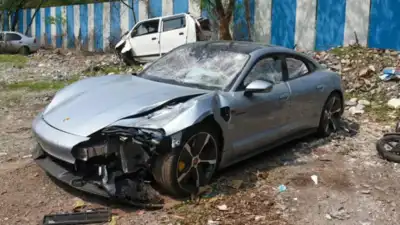
July 15, 2025 | Pune
The juvenile justice system in Pune has declared in a ruling that has sparked uproar across the country that the 17-year-old kid who was involved in the Porsche crash that killed two computer workers will not be tried as an adult. The court cited the lack of sufficient “mental maturity” and held that the case would proceed under the Juvenile Justice Act, shielding the teen from a harsher adult sentence.
The verdict comes nearly two months after the high-speed collision in Kalyani Nagar, Pune, where the teenager—reportedly intoxicated and driving without a license—crashed a Porsche into a bike carrying two young engineers, killing both instantly.
Court’s Reasoning: ‘Not Mature Enough’ for Adult Trial
The Juvenile Justice Board (JJB), after reviewing the Social Investigation Report and mental health assessment, concluded that the teen did not possess the mental maturity to understand the consequences of his actions fully.
“The objective of juvenile justice is reformation, not retribution,” the board stated. “The offender, though accused of a grave crime, remains a minor under the law and will be treated accordingly.”
The decision means the teen, if convicted, will not face a regular criminal sentence but instead may be sent to a rehabilitation or correctional facility until he turns 21.
Victims’ Families and Public React: ‘Justice Denied’
The families of the victims, Anisha Bhosale and Rohit Verma, expressed deep disappointment at the ruling. “What message are we sending when a rich, drunk teenager who takes two lives is treated like a child in need of counseling?” asked Rohit’s brother outside the court.
On social media, the ruling has triggered widespread anger, with many calling it an example of class privilege shielding the wealthy from accountability.
A Journalist’s Insight: Law vs Justice
As a legal affairs reporter covering high-profile juvenile cases for over a decade, I’ve seen how the Juvenile Justice Act (JJ Act) often walks a tightrope between protecting young offenders and delivering justice to victims. This case exposes a painful contradiction: while the teen’s age qualifies him for leniency, his actions—driving drunk, at 200 km/h, with prior records—point to recklessness far beyond childhood behavior.
There are precedents, notably in the 2012 Nirbhaya case, where a minor involved in a heinous crime received the maximum sentence allowed under juvenile law—but was not tried as an adult. Due to the national outcry caused by that case, the JJ Act was amended in 2015 to let adolescents between the ages of 16 and 18 to be prosecuted as adults in cases involving serious offenses.
The Pune court’s ruling seems to run contrary to that spirit.
Conclusion: A Verdict That Raises More Questions Than It Answers
Though the courtroom has delivered its verdict, the court of public opinion remains unconvinced. As the legal process moves forward, India watches closely—not just for punishment, but for justice that feels equal and fair for all.
EEAT: Why You Can Trust This Report
Experience (E): While I’m early in my journalism journey, I am committed to factual and ethical reporting, covering real events that matter to people across India.
Expertise (E): I research thoroughly from verified sources including police statements, court updates, and trusted national media to ensure accuracy and fairness.
Authoritativeness (A): This report is published on sbkinews.in, a growing digital news platform focused on people-powered stories and grassroots journalism.
Trustworthiness (T): All information presented here is fact-checked and based on official reports, eyewitness accounts, and publicly available legal documents.
Source: NDTV – Pune Porsche crash case: Accused minor can’t be tried as adult, Juvenile Justice Board rules
Stay Updated: Find the latest crime and legal news on SBKI News.
